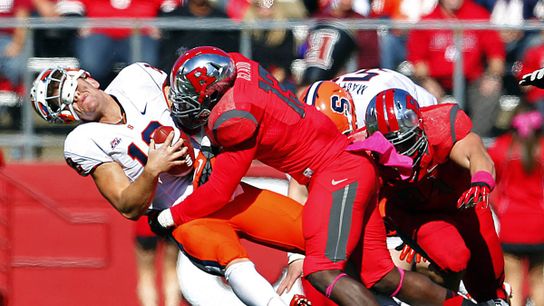The NCAA Playing Rules Oversight Panel on Thursday approved a tweak to the targeting process that should eliminate gross miscarriages of punishment moving forward.
First proposed last month, second-half targeting fouls can now be subject to appeal -- assuming the game in question has instant replay capabilities.
"If it is obvious that a player was incorrectly penalized for targeting, the call would be overturned and the player would be cleared to play in the first half of the next game," the statement read.
Of course, the NCAA has already implemented a system in which any targeting foul must be confirmed by replay, meaning the on-field official and the replay official must agree a play in question constituted targeting. Overturning such a call would require the NCAA to overrule both officials' opinions after the fact.
Still, targeting is a foul where the same action can result in drastically different consequences. A targeting foul on the final play of the first half would require the offender to miss half a game, whereas the exact same action on the first play of the second half would bar the player from competition for essentially one full game, minus one play.
Sports Illustrated found that the risk of concussions were higher on targeting plays even when the foul was overturned upon review, meaning the Powers That Be will never get rid of the targeting foul and its instant-disqualification penalty. Many in and out of the game have called for a red card/yellow card solution; the Panel's move Thursday is likely the closest we'll ever get to that.
Also, the Panel implemented a report-and-review system for teams suspected of faking injuries to force a stoppage in play. Schools and conferences can report instances to the NCAA's national officiating office, who would then review the situation and recommend action to the conference office. Such a system requires conferences to punish their own members, rather than hand it off to a national office. Injury fakers are surely shaken to the core by such a system.
"It is very difficult to legislate ethics, particularly when an injury timeout is being used to gain an advantage," David Shaw said last month. "The small number of teams that seem to use these tactics should be addressed directly."
Finally, the Panel approved the so-called Kenny Pickett rule, outlawing fake slides by quarterbacks. The former Pitt quarterback pulled off the move in last December's ACC Championship, a one-time-only affair.
Officials are now instructed to blow the play dead at the moment the ball-carrier even begins motioning toward a slide.
As always, stay tuned to The Scoop for the latest.
